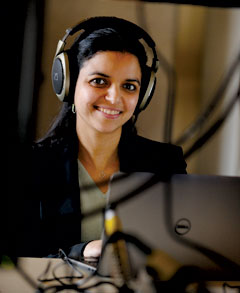Mounya Elhilali promoted to professor
Mounya Elhilali, a member of the Center for Language and Speech Processing who is a Charles Renn Faculty Scholar that joined the Department of Electrical and Computer Engineering in 2008 as an assistant professor, was recently promoted to professor from associate professor.
ECE Department Chair Ralph Etienne-Cummings describes Elhilali as part of a “new breed of ECE professors” because her work straddles two different disciplines.
“Mounya is a highly recognized research leader working at the interface of electrical and computer engineering and neuroscience. Multidisciplinary work is becoming the norm in ECE because ECE provides many tools that are useful to researchers in other areas,” he said. “In particular, Mounya is a signal processing expert, which means that she is able to speak the language of experimentalists and theoreticians. As a result, her work has applications in many areas, such as engineering in health care.”
Elhilali’s research combines engineering and brain sciences with the overarching goal of trying to understand how both humans and machines hears. Specifically, her group look at the processing of sounds by brain networks and its translation into smart-audio technologies.
Elhilali’s research has led to an improved understanding of the brain, as well as the creation of technologies that can emulate or even surpass biological intelligence. For example, she recently worked with James West, another ECE professor, on a smart stethoscope that can diagnose lung diseases, specifically pneumonia. The devices have already improved medical care in rural and impoverished areas of South America and Africa.
“These lung infections are the leading cause of childhood mortality worldwide, causing more than one million deaths and 150 million infections each year. That is more than deaths from HIV, malaria and tuberculosis combined,” Elhilali said. “Though many are treatable, access to medical care is a real impediment. By developing affordable technologies that can be deployed widely and using intelligent analysis of lung sounds to flag abnormalities, we may able to save numerous lives in underserved communities.”
Elhilali is also known for being an excellent mentor. Ben Skerritt-Davis, an ECE doctoral candidate, credits her for helping him land a grant from the National Institutes of Health by teaching him the importance of being able to describe his research accurately and understandably to a variety of audiences.
“A lot of it is about finding the right language and the right way of explaining your work so it has broad interest and impact,” Skerritt-Davis said. “She reminded me that you never know who will be reviewing your grant proposals, so you cannot assume they have the same expertise as you do.”
Elhilali was drawn to Johns Hopkins by its reputation as a premier institution for both engineering and medical research, making it ideal for her area of expertise. Now, after 12 years, she says that the institution has lived up to that reputation.
“The rich and cross-disciplinary work that goes on at Hopkins is a real asset to my work,” Elhilali said. “We have fostered and tremendously benefited from collaborations with colleagues within the Whiting School of Engineering and across multiple schools, including the Krieger School of Arts and Sciences, Bloomberg school of Public Health and School of Medicine. My work has also benefited from Johns Hopkins’ diverse research centers and institutes, including CLSP, the Center for Hearing and Balance and the Mind Brain Institute, as well as the Applied Physics Lab.”



